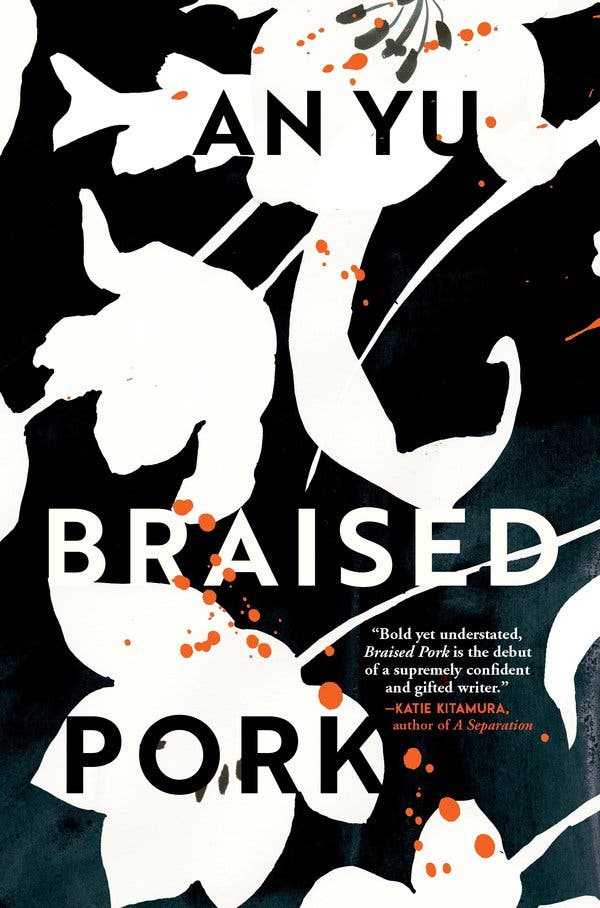BRAISED PORK
By An Yu
After her husband dies in a bathtub at home, Jia Jia finds a sketch of a half-man, half-fish sitting atop a stack of towels. “Braised Pork,” by An Yu, opens with the mystery of this man’s death — was it a suicide? did he drown? — but, much like the women in Haruki Murakami’s stories, the husband is less a character than a plot device. His presence in the novel serves only to propel Jia Jia into a journey of self-discovery, her quest to understand the meaning of the drawing leading her down a winding path into her past.
The book’s semi-surreal “world of water” — with its lonely late-night bars, its anthropomorphic creatures — rarely deviates from the tropes of magical realism, but the first-time novelist, who is Chinese but writes in English, puts her own touches on the genre with quiet observations about contemporary Beijing. It’s the city Yu was born and raised in, and you can tell; the pages throb with the isolation of life in a metropolis. Jia Jia takes an antipollution mask with her before heading outside. Bags pass through security checkpoints before passengers board the subway. Nietzsche sits on a bookshelf alongside titles on the Liao dynasty. A subplot involving Jia Jia’s family serves as a commentary on the faint line between corruption and guanxi, the Mandarin term for corporate networking, set against a backdrop of a nouveau riche home aquarium filled with “disconcerted” fish.
Yu’s prose is crisp and never tedious, with bursts of startling imagery amid the otherwise restrained style: At one point, Jia Jia recalls her mother lying in a hospital bed “like a white flower petal that had been tweezed off its stem.” The book is most enthralling when it juxtaposes the ancient and the aggressively modern (there are bronze dragons and Buddha wall paintings alongside Burberry hair clips, slick shopping malls), carefully weaving the disjointed, contradictory parts of Chinese society, like how sacred deities can be reduced to serving a New Age notion of karma.

Unfortunately, Yu introduces several topics only to abandon them before they reach the level of real insight: for example, the role of marriage today, the generational differences in Chinese attitudes toward widowhood and the financial realities Jia Jia faces as a painter struggling to make ends meet. Yu takes her protagonist to Tibet in search of spiritual answers, without a single mention of the region’s real-world political complexities.
Although “Braised Pork” is billed as a story of a “newly empowered young woman,” throughout the book Jia Jia continues to be defined by a series of relationships with men: her cold, unfaithful husband; a stoic bartender with whom she begins a halfhearted fling; a writer whose wife is missing and who makes her see her own art in a new light. The book shares similar themes with Wang Anyi’s “Brothers,” but where that 1989 novella painted an aching portrait of radical female homosociality, in “Braised Pork” the women are unreliable, subdued or absent altogether, demonstrating little agency or desire for a feminist collective. Jia Jia’s best friend appears for six pages to help her move, never to show up again. The grandmother she moves back in with mostly shuffles around the house cooking plain congee and doling out antiquated advice, while her aunt is doting but flighty, getting involved in one doomed business venture after another. The most complex female character in the book is mentioned only in memory: Before she died, Jia Jia’s mother was an adventurous traveler caged in by societal expectations. But even she remains always a victim of her own sadness, her “broken”-ness given a supernatural explanation that is more of a cop-out than a resolution.
Perhaps the most central of these relationships is the one Jia Jia has with her father. Reconnecting toward the end of the novel after decades of estrangement, they sit down together to share a meal of the book’s titular dish. “You used to ask for braised pork every day when you were a girl,” he says. After a few bites, she begins to cry. A metaphor for familial harmony — not the boisterous sitcom kind, but the kind that’s a quiet constant even in life’s moments of flux — the pork belly causes her to “become a shapeless and authentic version of herself. This change, she knew, was going to be irrevocable.”
But Jia Jia’s awakening is less a process of personal development than the result of a plot twist that allows her to finally move on from her father’s perceived betrayal long ago. As she flails within that liminal space between a traumatic past and a future reinvention, one wonders if such a swift reveal can ever fully subvert the myths upon which not just individuals, but nations, are built.
 EU News Digest Latest News & Updates
EU News Digest Latest News & Updates



